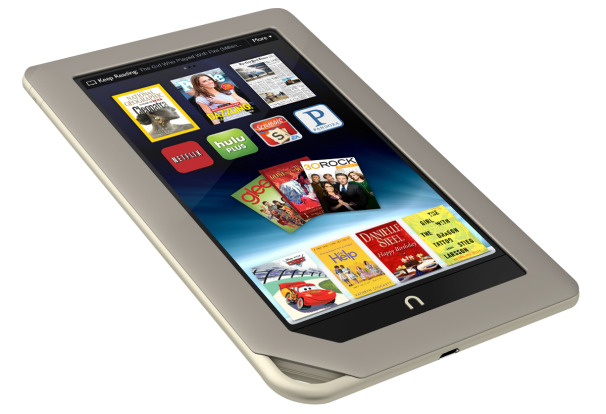One year ago, Microsoft and Barnes & Noble surprised the tech world by announcing a “strategic partnership.” Microsoft made a $300 million investment in the bookseller’s Nook e-reader and e-book subsidiary, for a 17.6 percent stake. The deal was completed in October, making Microsoft a key ally for Barnes & Noble in its struggle vs. Amazon’s Kindle. The software giant and the book giant, together at last.
 So naturally, in a new bid to revive the Nook, Barnes & Noble is now turning to … Google.
So naturally, in a new bid to revive the Nook, Barnes & Noble is now turning to … Google.
Yes, Barnes & Noble’s announcement on Friday that it will offer the Google Play store on its Nook tablets makes perfect sense in a lot of ways. Nook tablets are based on Android, and Barnes & Noble hopes to boost the slumping Nook business by giving its customers access to a much broader array of content.
But the plan also highlights the dearth of visible results from Microsoft’s investment in the Barnes & Noble unit. And it raises questions about the status of the relationship between the companies, given Microsoft’s intense rivalry with Google.
The biggest outcome from the partnership so far is the Nook app for Windows 8, released in November. As we noted at the time, it’s a solid app that takes advantage of Windows 8’s built-in features, such as the ability to pin individual books to the Start screen. But of course, any third-party developer should be able do that type of thing, $300 million not required.
And where’s the Windows Phone app? A provision of the partnership agreement calls for Barnes & Noble to develop a Nook app for Microsoft’s smartphone platform. The agreement gives a specific timeframe for the development of the mobile app, but that’s one of the details redacted from the public version of the contract, so it’s not clear if the original deadline has been missed.

I’ve sent messages to representatives Microsoft and Barnes & Noble to find out if they have any further details to share. Among other things, I asked Barnes & Noble if Microsoft, as a Nook investor, was consulted on the plan to use the Google Play store.
The Barnes & Noble agreement, signed by Microsoft CEO Steve Ballmer himself, is one of a series of investments and partnerships by the company in areas where it needs to catch up. Last year the company acknowledged that its $6.3 billion aQuantive acquisition was a bust, writing down almost the entire value of the deal. Microsoft’s Facebook investment, on the other hand, has helped Microsoft at times in its competition with Google by strengthening its ties to the dominant social network, even if they aren’t always the best of friends.
The jury is still out on the Barnes & Noble deal. The rest of the year should be very telling. A cryptic reference in the agreement to a “Microsoft Reader” has fueled theories that Microsoft is developing its own e-reading device, incorporating the Nook catalog and platform. With Microsoft recently opening the door to smaller Windows 8 tablets, that becomes a bigger possibility.
But this partnership was an odd coupling from the start, coming as part of the settlement of a patent dispute between the companies over Barnes & Noble’s use of Android. Microsoft says that Android violates its patents, and has struck a series of licensing agreements in which it receives royalties from Android device makers.
In the midst of the litigation, Barnes & Noble went to the U.S. Justice Department with a 29-slide deck alleging that Microsoft’s Android patent lawsuits and licensing efforts amounted to a new era of anti-competitive behavior from Microsoft. Here’s one of the slides that Barnes & Noble presented to the DOJ at the time.

Yes, lawyers representing companies in litigation will say lots of things about whoever is suing their clients. And presumably it’s all water under the bridge for the companies by now. But is this really the foundation of a strong partnership?
Given all of this history, and the challenges facing their businesses, it will be fascinating to see if these two companies can actually help each other out.



